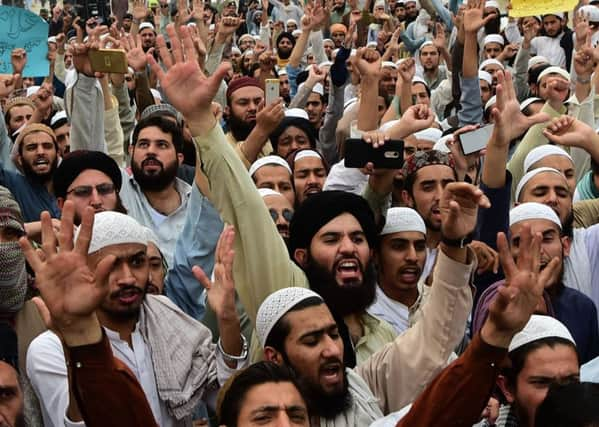Safeena Rashid: When justice is not welcomed by all


My fleeting Pakistani legal education was quite different to what I anticipated. This was because of a verdict from the Supreme Court in the blasphemy case against Asia Bibi. The verdict was of acquittal and the response from certain political factions was of disapproval.
This disapproval was noted through mobilising themselves and their followers in mass protests across Pakistan. The result was a nation almost at a complete standstill.. As I walked the streets of Lahore, there were nose-to-tail trucks parked across roads preventing anyone passing. Even as a pedestrian, the only way I managed to get to the other side of the road was to duck underneath a truck. This resulted in people sitting in their vehicles for hours in queues of traffic whose movement was wholly unpredictable.
Advertisement
Hide AdAdvertisement
Hide AdPolitically, the government had to react to this. My impression was that it was trying to maintain silence in the hope that passions of protesters would fade within a reasonable time. This tactic was unsuccessful and the government was forced to negotiate. Protests lasted for three days and stopped just in time for my journey to the airport. Protests ending meant negotiations between protest leaders and the government had concluded.


This interplay between law and politics was certainly unwelcome. The average resident was frustrated at the interference with their daily lives. Regardless of their views on this particular case, people had a living to earn and lives to live. Protests were stopping food and fuel supplies from being transported, resulting in rising prices. Even trucks full of livestock were stranded.
Walking through protests, I could hear people making speeches, singing religious songs and chanting about their love for the Prophet Muhammad (peace and blessings be upon him). Chaos and huge disruption are not a way to show love for anyone, let alone the esteemed leader of both the protesters and the people being inconvenienced.
As an outside observer, it amazed me that certain political parties had enough power to be able to mobilise themselves so quickly across the country. I cannot fathom any situation in the UK where that is a possibility. Ultimately, the issue is a lack of education. Followers of these political factions are no doubt poor and illiterate. Whilst a lack of education is not indicative of a lack of intelligence, being able to read and write opens up a world of opportunities for progression and independent thinking in religious affairs.
For example, I wondered whether anyone protesting had read the Supreme Court’s judgment. I suspect not, but it is something I took the initiative to do out of intrigue.
In reading the judgment, it was clear to me that this is not a matter the judges took lightly. Eight pages of the chief justice’s 34-page opinion outline the theological position. Thereafter, the political and historical landscape of the blasphemy issue are narrated. There is no doubt about the court’s appreciation and understanding of the importance of the issues at hand. The judgment makes clear that sentencing is a matter for the state and that individuals do not have the right to take matters into their own hands. With these general remarks as a prelude, the judgment goes on to consider the specific case in detail, highlighting problems with the prosecution case and emphasising two principles that are also well known to the Scottish criminal lawyer – proof beyond reasonable doubt and the presumption of innocence.
These principles are an important bedrock to any legal system and it seems that a Pakistani court finally applied these principles to the benefit of Asia Bibi. Regardless of the well-reasoned judgment, though, politics appears stronger than the law in Pakistan at the moment. The average protester perhaps will not understand the nuances of this specific case and will be reacting emotionally rather than rationally. In order to address this, the importance of education can never be underestimated. Certainly for me, my trip to Pakistan was educational in ways I did not expect.
Safeena Rashid is a member of the Faculty of Advocates. She has written this article in a personal capacity.